This is the free version of The Morning Dispatch. To unlock the full version and start your day informed on the biggest stories impacting your world, become a Dispatch member.
Happy Friday! Attorney General Pam Bondi and Interior Secretary Doug Burgum visited Alcatraz on Thursday to prepare the former island prison to once again “hold the worst of the worst.” We imagine that’ll give the tourist site’s annual “Escape from the Rock” race a whole new sense of urgency.
Quick Hits: Today’s Top Stories
- Syrian government forces mostly withdrew from the southern province of Sweida on Thursday, as a truce in fighting with Druze militias—brokered by Turkey, the U.S., and Arab nations—continued to hold. Clashes between Druze fighters and Sunni Bedouin tribes broke out on Sunday and continued into this week, prompting the intervention of Syrian security forces and the Israeli military, which struck several government targets. On Thursday, Syrian President Ahmed al-Sharaa called for calm and vowed to protect the country’s Druze communities, describing the minority sect as a “fundamental part of the fabric of this nation.”
- Ukraine’s parliament appointed Denys Shmyhal as minister of defense on Thursday, two days after he announced his resignation as prime minister. His decision to step down followed mounting allegations of mismanagement against members of Ukrainian President Volodymyr Zelensky’s Cabinet. Zelensky appointed Yulia Svyrydenko, the former economy minister who was involved in negotiating the minerals deal with the U.S., as prime minister. He also announced Thursday that Olha Stefanishyna, the former deputy prime minister for European integration, would become the new ambassador to the U.S., replacing Oksana Markarova.
- The British government said Thursday that it would move to allow 16- and 17-year-olds to vote in the next general election, part of a set of election reforms that would also ease voter registration rules and seek to protect against foreign interference. “Declining trust in our institutions and democracy itself has become critical, but it is the responsibility of government to turn this around and renew our democracy,” Deputy Prime Minister Angela Rayner wrote in the policy paper that included the measures. Critics say that the change is an attempt to increase the number of potential Labour voters.
- The Associated Press reported Thursday that the Centers for Medicare and Medicaid Services signed an agreement with the Department of Homeland Security to give Immigration and Customs Enforcement officials access to the personal data of Medicaid enrollees. The agreement, which was finalized Monday and has not been announced publicly, will give ICE officials the ability to access the personal addresses and ethnicities of enrollees in order to find and deport illegal immigrants. Illegal immigrants are not allowed to enroll in standard Medicaid coverage, although they often use emergency Medicaid, a temporary program that pays for lifesaving services.
- The Justice Department asked a federal judge Wednesday to sentence a former Louisville, Kentucky, police officer convicted of violating the civil rights of Breonna Taylor—a woman who was shot and killed during a botched drug raid in 2020—to one day in prison and three years of supervised release. Brett Hankison, who participated in the raid and shot blindly into Taylor’s home, faces a maximum sentence of life in prison. But lawyers for the Justice Department argued Wednesday that although Hankison “was part of the team executing the warrant, Defendant Hankison did not shoot Ms. Taylor and is not otherwise responsible for her death.” Judge Rebecca Grady Jennings will take the government’s request into account at a sentencing hearing next week.
- President Donald Trump was diagnosed with chronic venous insufficiency, a circulatory issue common in people over 70, the White House physician said in a memo on Thursday. Noting that the president “remains in excellent health,” the physician said Trump underwent a “comprehensive examination” after noticing mild swelling in his lower legs. The condition—the result of damaged veins—impedes blood flow from the legs to the heart, in some cases causing varicose veins and leg sores.
Cautious Optimism in Kyiv

Sometimes all we need to change our outlook is a wake-up call from our significant other. That certainly appeared to be the case for President Donald Trump, who on Monday attributed his pivot on Ukraine to first lady Melania Trump. “I go home, I tell the first lady, ‘And I spoke with Vladimir today. We had a wonderful conversation,’” he told reporters. “She said, ‘Oh, really? Another [Ukrainian] city was just hit.’”
During a press conference the same day with NATO Secretary-General Mark Rutte, Trump hit Russia with an ultimatum: Reach a ceasefire agreement within 50 days or face “very severe” economic penalties. If implemented, the plan would impose a 100 percent tariff on countries that buy Russian goods. At the same time, the president pledged to funnel advanced, U.S.-made weapons into Ukraine—with Europe footing the bill.
Trump’s announcement, his latest of many U-turns on how to approach Russia’s ongoing war in Ukraine, was met with cautious optimism in Kyiv. But many questions about the future of U.S. support to the embattled country remain, particularly as Moscow seeks to wear down its enemy through a continued ground offensive and unprecedented aerial assaults on population centers across Ukraine.
“It’s a horrible war, and it should be stopped,” Trump said from the Oval Office on Monday. “And so if it’s not done, if we don’t have an agreement in 50 days, that’s what we’re doing, secondary tariffs and they’re biting.”
The White House’s tariffs plan appears to draw inspiration from the Sanctioning Russia Act, a bipartisan bill calling for 500 percent duties on any country that imports Russian oil and gas. In addition to the blanket tariffs he laid out on Monday, Trump said he was “strongly considering” backing the legislation during a Cabinet meeting on Tuesday, appearing to reverse course on his prior emphasis on negotiation over coercion.
And it’s not the first time congressional Republicans have pushed the president into taking a harder line on Moscow. During Trump’s first administration, the House and the Senate passed the Countering America’s Adversaries Through Sanctions Act, or CAATSA, with veto-proof majorities, forcing the White House to impose sanctions against Russia’s military and intelligence sectors.
This time around, Russian officials responded to the threat of a new tranche of sanctions with a mixture of indifference and hostility. “Trump issued a theatrical ultimatum to the Kremlin. The world shuddered, expecting the consequences,” senior Russian defense official Dmitry Medvedev wrote on X. “Belligerent Europe was disappointed. Russia didn’t care.” Deputy Foreign Minister Sergei Ryabkov, meanwhile, said “any attempts to make demands, especially ultimatums, are unacceptable to us,” threatening: “If we cannot achieve our goals through diplomacy, then the [war in Ukraine] will continue.”
But Russia and its supporters aren’t the only ones raising questions about Trump’s 50-day deadline. Some analysts have framed the timetable as a window during which Moscow can continue its attacks on Ukraine with impunity. Others have questioned the White House’s end goal going into possible ceasefire negotiations. If Russia proposed an agreement that would require Ukraine to give up large swaths of territory or relinquish future security guarantees, for example, would the Trump administration pressure Kyiv into accepting it?
Still, the announcement of new weapons shipments—which will include Patriot air defense systems, missiles, and ammunition—to Ukraine may mark a broader shift in Trump’s approach to the conflict, particularly after the administration threatened to halt the flow of arms to the war-torn country. As we wrote this week, the president’s about-face appeared to contradict the decision-making of his own Defense Department:
On July 1, Pentagon officials announced that certain weapons shipments, including some types of air defense weapons and field artillery shells, would be put on hold. The move followed a Pentagon review of U.S. weapons stockpiles, reflecting concerns by influential figures within the administration, such as Undersecretary of Defense for Policy Elbridge Colby, that the U.S. is stretching its supplies dangerously thin. “This decision was made to put America’s interests first following a review of our nation’s military support and assistance to other countries across the globe,” said Anna Kelly, a White House spokeswoman.
The White House’s reversal came amid Russia’s summer offensive in Ukraine. On the battlefield, Moscow has made slow but steady advances across three fronts in the east and north, facing fierce resistance but exhausting Kyiv’s manpower and weaponry in the process. The Russian military currently occupies about 20 percent of Ukraine’s territory, a figure that has remained relatively static throughout the war despite this latest offensive push. “Russia is advancing at various points on the front, but they are not advancing with any speed or decisiveness yet,” Peter Dickinson, a Ukraine analyst at the Atlantic Council, told TMD. “It is progress, but it’s very, very slow and it’s not going to win the war.”
But the Kremlin has accompanied its ground maneuvers with intensifying drone and missile attacks across the country, including cities. “To put it in perspective, last summer, let’s say 100 drones in a night would have been a big attack, it would have been a headline. Now they are firing like 700 drones in a night, overwhelming Ukraine’s defense systems,” Dickinson said, adding: “The Patriot systems are among the only systems that can intercept Russian ballistic missiles.”
Just this month, Russia carried out what Ukrainian officials described as its largest aerial assault to date, launching 728 drones and multiple missiles in an effort to exhaust Ukraine’s air defenses. By maximizing the pain for Ukraine’s civilian population, Russia is “putting pressure on the Ukrainian government to end the war,” Bob Hamilton, the director of Eurasia research at the Foreign Policy Research Institute, told TMD.
However, some analysts are skeptical that Russia’s bombing campaign can achieve its intended goal, and, in the meantime, it appears to have forced the White House to rethink its approach to the ongoing conflict.
“This is a war crime that the Russians are committing—one of numerous, of course, in this war—but it’s not something that's going to achieve any effect on the battlefield,” Dmitri Alperovitch, chairman of Silverado Policy Accelerator, told TMD. “City bombing campaigns like this have never worked.”
Today’s Must-Read
In the years leading up to the American Revolution, colonial leaders enlisted several authoritative sources in their complaints against King George and the British Parliament: the Bible, the English constitution, and Enlightenment philosopher John Locke. In fact, it is not too much to say that Locke’s political outlook framed nearly all of the core arguments for American independence. Some revisionist scholars, such as J.G.A. Pocock in The Machiavellian Moment (1975), have tried to marginalize Locke’s presence from the American story. But more recent works—including The Reception of Locke’s Politics, edited by Mark Goldie, and Political Sermons of the American Founding Era, edited by Ellis Sandoz—effectively demolish this view. Colonial assumptions about natural rights, human equality, religious liberty, government by consent, the right of revolution: Each drew heavily from Locke’s writings, which were considered mandatory reading for educated Americans.
Toeing the Company Line
Let’s Get On With It
The (probably) inevitable firing of Jerome Powell.
The Great Tariff ‘Inflation’ Confusion
Higher prices on certain goods still mean pain for American consumers.
Conspiracy Central
And those meddling Russians.
Worth Your Time
- Last week, the Internal Revenue Service said that it would allow religious leaders to endorse political figures from the pulpit, dropping a longstanding rule banning political activity by tax-exempt religious institutions. For The New York Times, Maya King reported on how congregations across New York are grappling with the change amid a heated mayoral race. “For some, the change offers a chance to leverage newfound political influence. Some Muslim faith leaders and organizers seek to increase political engagement among the city’s more than one million Muslims and push city leaders to prioritize policies relevant to their communities. That effort has coincided with Mr. Mamdani’s bid to become the city’s first Muslim mayor. ‘The potential is huge for masajid to get involved and to endorse,’ said Afaf Nasher, executive director of the New York chapter of the Council on American-Islamic Relations, which is nonpartisan. She added: ‘We’re growing more sophisticated, the Muslim community, in terms of looking at politics.’”
- Loneliness is often referred to as an epidemic in modern society. For some, the recent rise of AI companions offers a way out of isolation. But loneliness has its virtues, psychologist Paul Bloom wrote in The New Yorker. “From an evolutionary perspective, isolation meant not just the risk of death but, worse, the risk of leaving no descendants. In this sense, loneliness is corrective feedback: a nudge, or sometimes a shove, pushing us toward connection. Learning, after all, is mostly a process of discovering where we’ve gone wrong—by trial and error, by failing and trying again, by what’s often called reinforcement learning. A toddler figures out how to walk by toppling over; a comedian improves her act by bombing onstage; a boxer learns to block by taking a punch,” he wrote. “Loneliness is what failure feels like in the social realm; it makes isolation intolerable. It can push us to text a friend, show up for brunch, open the dating app. It can also make us try harder with the people already in our lives—working to regulate our moods, to manage conflict, to be genuinely interested in others.”
Presented Without Comment
Wall Street Journal: Jeffrey Epstein’s Friends Sent Him Bawdy Letters for a 50th Birthday Album. One Was From Donald Trump.
The letter bearing Trump’s name, which was reviewed by the Journal, is bawdy—like others in the album. It contains several lines of typewritten text framed by the outline of a naked woman, which appears to be hand-drawn with a heavy marker. A pair of small arcs denotes the woman’s breasts, and the future president’s signature is a squiggly “Donald” below her waist, mimicking pubic hair.
The letter concludes: “Happy Birthday — and may every day be another wonderful secret.”
In an interview with the Journal on Tuesday evening, Trump denied writing the letter or drawing the picture. “This is not me. This is a fake thing. It’s a fake Wall Street Journal story,” he said.
“I never wrote a picture in my life. I don’t draw pictures of women,” he said. “It’s not my language. It’s not my words.”
Also Presented Without Comment
Los Angeles Times: Army Vet Calls for Investigation After Being Detained for Three Days in ICE Raid
In the Zeitgeist
Ari Aster, the director of acclaimed horror films Midsommar and Hereditary, has a new film out this Friday: Eddington. The black comedy depicts a COVID-era political showdown in a small town in New Mexico. If you’re a masochist and want to relive that period, you’re in luck!
Let Us Know
Should tax-exempt religious institutions be able to endorse political candidates?
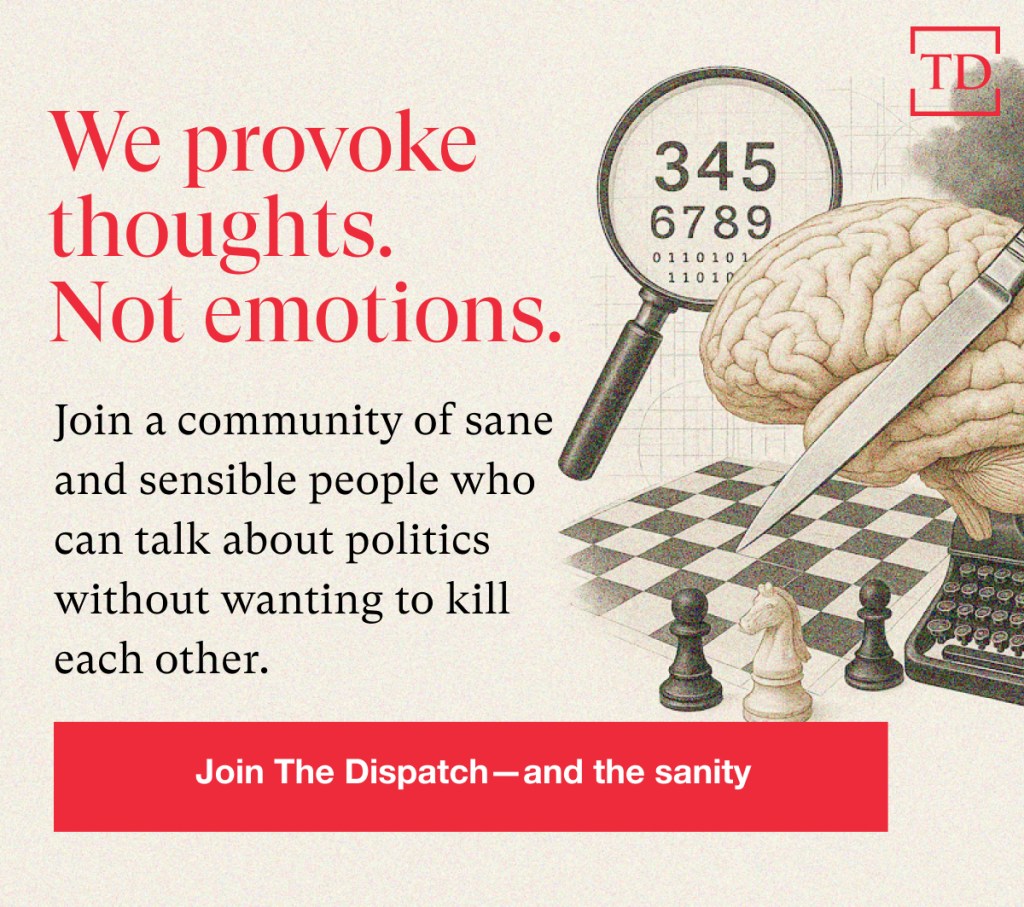
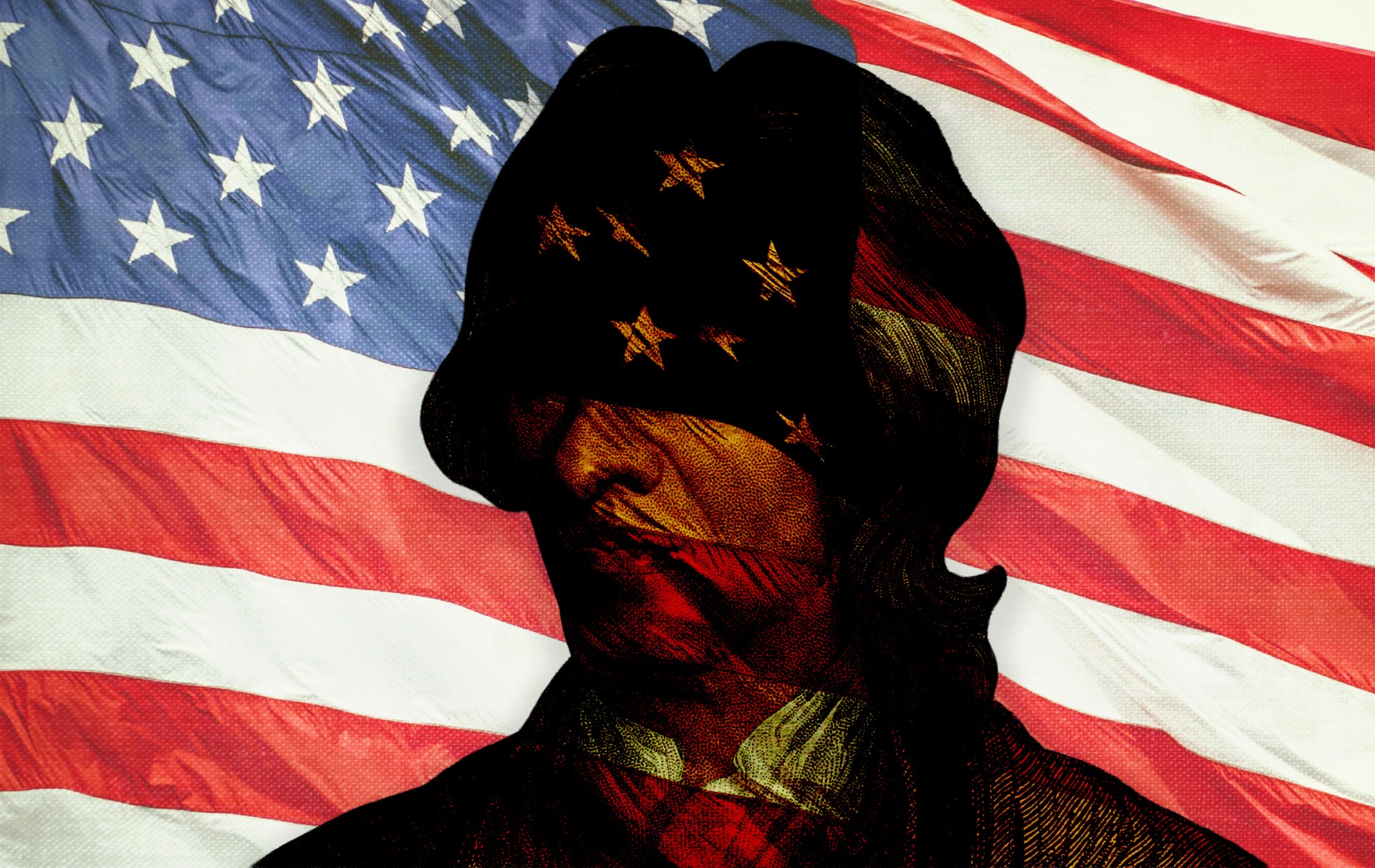
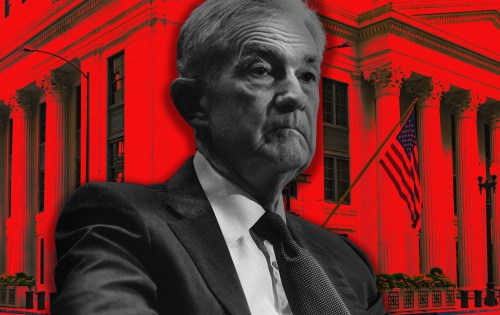
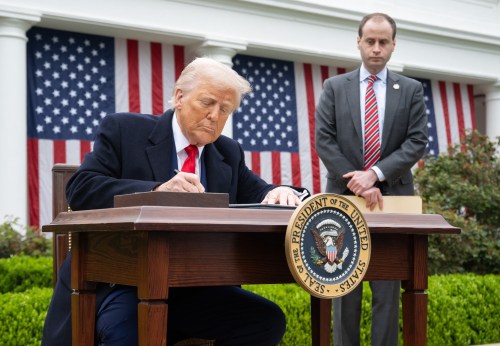
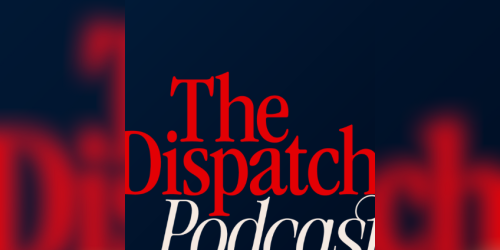
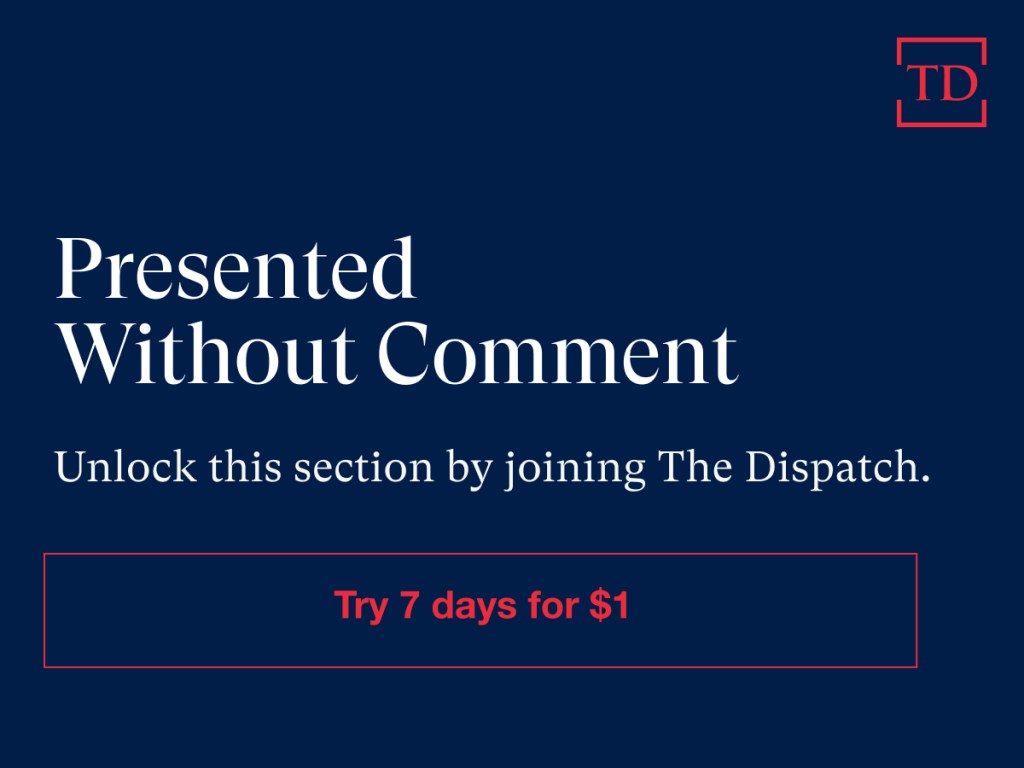



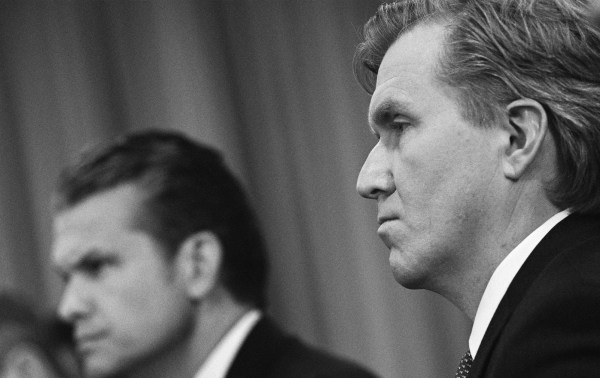
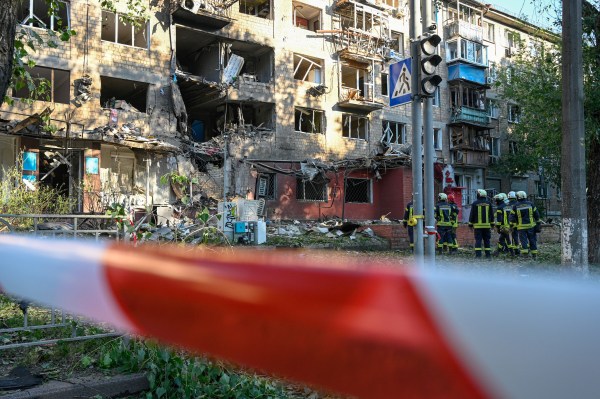


Please note that we at The Dispatch hold ourselves, our work, and our commenters to a higher standard than other places on the internet. We welcome comments that foster genuine debate or discussion—including comments critical of us or our work—but responses that include ad hominem attacks on fellow Dispatch members or are intended to stoke fear and anger may be moderated.
With your membership, you only have the ability to comment on The Morning Dispatch articles. Consider upgrading to join the conversation everywhere.